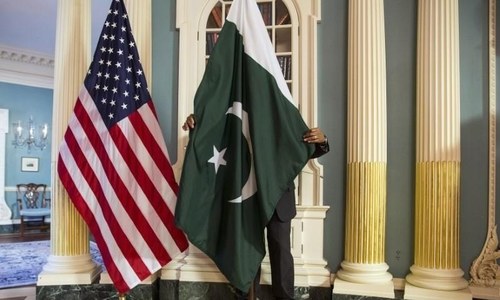TWO separate talks are being held on two separate tables these days, and it is increasingly likely that the twain shall meet. One set of talks has been in the news a lot lately, between the intelligence, military and diplomatic leadership of the United States and Pakistan. A lot of commentary is revolving around the question of whether Pakistan will grant permission for an American base for counterterror purposes after the withdrawal of forces from Afghanistan. Clearly, this is a big part of the American ask in these talks.
The ‘leaks’ to the New York Times in which this was first revealed were not fortuitous. Somebody was communicating with someone else through the media in those ‘leaks’. Jake Sullivan, the US national security adviser, did not mention bases, but confirmed that talks are underway on “the future of America’s capabilities” for counterterror purposes in Afghanistan following the withdrawal of forces.
The other table is a more familiar one: the IMF. The new finance minister, Shaukat Tarin, has made it clear that Pakistan will be seeking a renegotiation of the IMF programme that was restarted in April after a year-long hiatus. Specifically, he wants to wiggle out of the commitments given by his predecessor on power tariff hikes, revenue measures through the elimination of tax exemptions for corporates, curbs on spending and hikes in the petroleum development levy, and, quite possibly, abort the move to usher in greater central bank independence and wind up its refinance facilities. He has also said that he will seek more funds from the IMF, possibly through another purchase under the Rapid Financing Instrument under which Pakistan received $1.4 billion last year as the lockdowns began. To my knowledge the request for additional resources is taking a back seat while the talks continue for changing programme targets and structural conditionalities.
In other remarks, Tarin blamed the IMF for higher inflation in Pakistan, though it was difficult to figure out how the Fund might be responsible, given the government and the State Bank have been describing rising food prices as “temporary supply shocks” in repeated statements. He also said the Fund “held a gun to our head and made us raise interest rates” when the programme began in 2019, which also belies the many on-record comments made by the State Bank governor during the days when the policy rate was pushed up to 13 per cent. By his own telling, the governor used to tell everybody he met in those days that interest rates have to remain pegged to projected CPI inflation by year end. Even now the State Bank describes present interest rates as “accommodative”, meaning they are negative in real terms (below inflation) and must remain so to allow growth to continue.
A beleaguered PM, who has many mouths to feed and is feeling the heat of public anger, cannot afford to walk the line set by the IMF.
The IMF has made known its reluctance to make major alterations to the programme. In an on-record interaction with journalists, the mission chief emphasised that sequencing of certain requirements can be changed, but overall programme objectives and targets cannot. This was back in April. Recent press reports, sourced to anonymous finance ministry officials, suggest that amendments to the Nepra Act remain a sticking point, and that the Fund does not seem to be budging on other issues either, such as revenue measures for next year and relaxation of spending curbs mandated under the programme.
With the budget only a day away and talks set to conclude today (Thursday), it is looking unlikely that a breakthrough will materialise across so broad a front, and the government will be in a delicate position to decide whether to announce a budget under the IMF terms or its own and continue with the talks. How that will impact the ongoing sixth review and board approval will be a large question mark.
The prime minister is under extreme pressure to pump growth further next year, as well as enhance spending. Contrary to what the IMF has been asking, the development budget for next year is proposed to be hiked by almost 50pc. Civil servants’ salaries have already been committed to be increased, though we will know the exact amount on Friday. And equally important, the defence budget is programmed to be hiked by almost Rs242bn, or 19pc, to Rs1.531 trillion under the medium-term plan released by the finance ministry only a few days ago.
So a beleaguered prime minister who has many mouths to feed and is increasingly feeling the heat of public anger as inflation eats away their incomes and wages, cannot afford to walk the line set by the IMF in its latest programme. And his team is finding out that renegotiating these commitments is not as easy as they might have thought initially.
This is the context in which the accelerating pace of contacts between the security officials of Pakistan and the US should be seen. If there is a way out for them, it is to find a way to get White House leverage to apply on the IMF to urge it to first relax the conditions on Pakistan, and then to enhance the access to resources. This may or may not involve granting basing rights to the CIA that the New York Times article talked about. But it will certainly mean taking on an expanded role in ensuring stability in Afghanistan does not deteriorate once the American withdrawal ends in July.
Rarely have I seen things come down to the wire the way they are today. No announcement has come from the ongoing talks with the IMF under the sixth review on the eve of the budget. Meanwhile, the disclosures of the security talks suggest that the US is increasing the pressure behind its ask at the table. At some point soon, a decision will have to be made. If Imran Khan wants his growing economy to continue next year, he will have to find a way to satisfy the Americans in the security talks.
The writer is a business and economy journalist.
Twitter:@khurramhusain
Published in Dawn, June 10th, 2021

















































